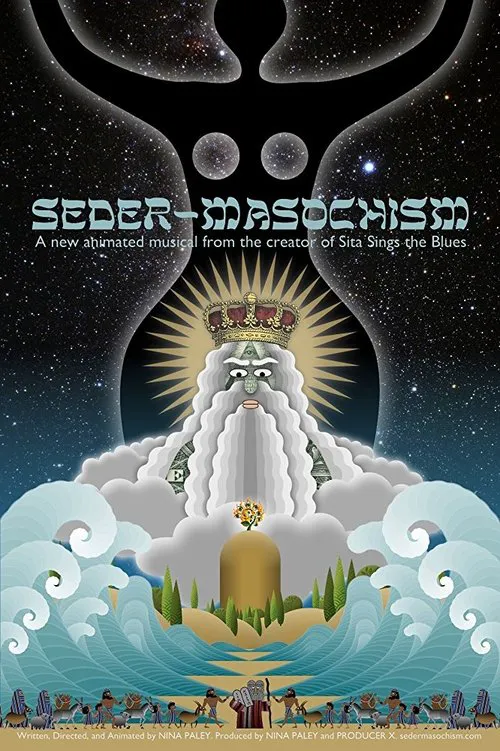Seder-Masochism

Plot
Seder-Masochism is a visually striking and irreverent animated film that deconstructs the traditional Passover Seder by presenting an alternate narrative. This narrative focuses on the Goddess, a figure largely absent from mainstream interpretations of the Book of Exodus. By weaving various voices and perspectives, the movie creates a rich tapestry that subverts the dominant narrative and highlights the marginalized aspects of the biblical tale. The film's narrative is presented through the voices of Moses, Aharon, the Angel of Death, Jesus, and the director's own father, each of whom offers a unique interpretation of the events leading up to the Exodus. However, it is the Goddess who serves as the film's central figure, with her story woven throughout the narrative. Initially, Seder-Masochism presents its audience with a version of the story that is both familiar and yet distinct. The viewer is presented with Moses, a character often depicted as the iconic hero, but here he is portrayed as both a complex figure who is driven by conflicting loyalties and a deeply human individual struggling to navigate the divine expectations placed upon him. Moses's interpretation of events serves as a foil to the narrative that will soon unfold. As he recounts the story of the Israelites' enslavement in Egypt and their subsequent liberation, the viewer begins to sense the deeper narrative threads that will soon come to the fore. It is Aharon, Moses's brother, who initially suggests the presence of the Goddess. His narrative hints at a divine feminine who is both nurturing and powerful, with Aharon framing her as the original creator of the universe. This initial introduction sets the stage for a narrative that will gradually peel away the layers of patriarchal mythology and reveal a more fundamental, earth-based spirituality. As the story continues, the viewer is introduced to the Angel of Death, a figure both fascinating and terrifying. In this context, the Angel of Death serves as a representative of the divine forces that seek to maintain the status quo. His narrative highlights the dark underpinnings of human history, revealing the brutal nature of the enslavement of the Israelites and the divine indifference to their suffering. The introduction of Jesus is an unexpected element in the narrative. His voice serves as a counterpoint to the earlier characters, with Jesus framing the events leading up to the Exodus in terms of a spiritual journey towards enlightenment. Jesus's perspective adds a layer of complexity to the narrative, raising questions about the nature of spirituality and the relationship between the divine and humanity. The film takes an unusual turn with the introduction of the director's own father, whose voice adds a personal and introspective element to the narrative. By incorporating personal memories and experiences, the father's narrative serves as a bridge between the biblical story and the viewer's own experiences. The central narrative thread, however, remains the tale of the Goddess, a figure whose story is woven throughout the film. The viewer is presented with an image of a powerful, earth-based deity, a figure of fertility and life who is brutally suppressed by the forces of patriarchal domination. The Seder-Masochism's retelling of the Exodus story becomes a metaphor for the struggle between the Goddess and the forces of Patriarchy. This struggle is a powerful allegory for the ways in which societies have historically sought to erase or marginalize the feminine principle, viewing it as a threat to their own power and authority. The film culminates in a tragic confrontation between the Goddess and the Angel of Death, a confrontation that serves as a powerful critique of the ways in which societies have historically viewed the feminine principle. The Goddess's tragic defeat serves as a poignant reminder of the devastating consequences of patriarchal suppression. As Seder-Masochism reaches its conclusion, the viewer is left to ponder the film's implications. By retelling the Exodus story through the voices of multiple characters and perspectives, the film serves as a powerful corrective to the dominant narrative, highlighting the marginalized aspects of the biblical tale and the devastating consequences of patriarchal suppression. In its portrayal of the Goddess, the film offers a compelling vision of a powerful, earth-based deity, a figure who embodies the fundamental forces of life and fertility. Ultimately, Seder-Masochism's exploration of the Goddess serves as a powerful metaphor for the human condition. The film's portrayal of the struggles between the divine and the forces of Patriarchy serves as a reminder of the ways in which societies have historically sought to impose their will upon the world around them, erasing or marginalizing the feminine principle in the process. As the film concludes, the viewer is left with a sense of the profound consequences of this suppression, a reminder of the devastating impact it has had on human societies and the natural world.
Reviews
Recommendations




